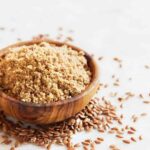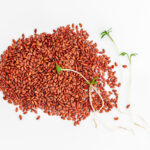What Does GSG Think About the Paleo Diet? Part 1 of 2
Dear GreenSmoothieGirl: Will you blog on what is wrong with the Paleo diet? We have Crossfit fanatics all around us and they are pushing it. It would be nice to have something I could print off and refer to it. I know it’s bad, but I can’t explain why. The Crossfit teachers say they have empirical data to back up this style of eating for health. –Marianne
Answer: I’d love to answer this!
The Paleo Diet is a fad. It’s also known as the “caveman diet,” and it is an iteration of what the D’Adamos made a fortune on, the Eat Right for Your Blood Type Diet. Both are grounded in the idea that you should eat what your ancestors ate. That’s the “empirical evidence” they refer to. However, you can find some clear evidence that debunks the false or tenuous links to Paleo being a solid nutritional program.
Let’s cover some main points.
Nutrition
Nutritionally speaking, if I’m trying to say something fair and balanced here, Paleo is better than the Atkins Diet, which may be the worst massively popular diet in history. (Unlimited bacon and eggs—enough said!) In theory at least, Paleo is a little better than the low-carb Atkins Me-Too diets, like South Beach and Zone. Those guys saw Atkins making millions, so they jumped in the stream, before the low-carb decade burned out. As all fads do.
Paleo is better than the decade of suffering through the “low-fat” insanity many of us grew up with, too, which radically changed the food supply for the worse and introduced many more manipulated, unnatural foods still being manufactured and sold to an unsuspecting public. Paleo is about the same, health-wise, as the totally ridiculous and easily discredited Eat Right for Your Blood Type, Dr. Mercola’s typing diet, and many others.
The Good and The Bad
Good things about the Paleo diet: very low salt, high vegetable consumption, and elimination of processed foods, hybridized grains, refined oils, fatty meats, and dairy products.
Hang on, though. Bad things include too-low consumption of high energy (carbohydrate) foods, eliminating even good grains and legumes. Another issue is the heavy load on the body of eating so many animal products. This causes higher cancer risk, kidney stones and osteoporosis, and draining the body of calcium to buffer pH due to such high acidity.
Trying to eat “Paleo” is extremely expensive. Worse, it may not even be duplicatable in the modern age (given the way meat products are manipulated in our marketplace) without massive off-the-grid effort.
Negative Evidence
The most clear empirical evidence AGAINST Paleo may be this:
In 2011, U.S. News & World Report ranked 20 diets based on health, weight loss, and how easy the diet is to follow. The Paleo diet ranked dead last, by the panel of 22 experts. The following year, 2012, 25 diets were ranked and Paleo tied for last place. Why? The experts “took issue with the diet on every measure.”
Their Evidence
Those who advocate for this diet say that indigenous peoples who follow this diet have no disease. The diet is a lot of lean, simply prepared meats, and wild vegetables. A LOT of meat. No grains. Low carbohydrate.
That’s the “empirical evidence” they’re referring to, that Paleolithic man had no cancer, heart disease, or auto-immune disease. While it’s true that Paleolithic man had no cancer or heart disease, dig a little deeper with your thinking, and remember: CORRELATION DOES NOT IMPLY CAUSATION.
The problem is, other scientists have explained, that there are OTHER factors from the Paleolithic era that may explain much better why there was no degenerative disease.
A Modern View
For instance, low caloric intake, no processed foods, no chemicals in environment or water or dental materials, short average lifespans, and many other factors surely have some impact. Some of the experts who have reviewed the diet point to the disease risks of following this diet attempting to use foods available to us in the modern age, as well as flawed logic related to evolutionary theory.
The experts who review and criticize the Paleo diet say that the five studies on health implications of Paleo are too short, with a sample size too small, to be conclusive.
It may be true that the Paleo diet will lead to more muscle mass and less fat. (Almost any diet will that improves on the Standard American Diet – which isn’t hard to do.) But the diet that many Americans are doing under the “Paleo” banner isn’t at all the same as what cavemen ate. To the extent you can come even close to approximating what cavemen ate, which is difficult, nigh unto impossible, the diet is almost obscenely expensive, to the point that is simply unsustainable by most people.
So Paleo followers, therefore, default to a diet they THINK is clean and simple, but which actually may have quite a few deadly meat-processing chemicals like nitrites and nitrates, plus toxic sodium chloride and more. You have to be very serious about your diet, and very educated, to avoid those things, within the food groups Paleo tells you to eat.
My biggest general issue beyond the health implications, with the Paleo Diet, is that it’s utterly unsustainable, eating incredibly high on the food chain and taking more than your fair share of the Earth’s resources. One pound of beef costs 1,000 gallons of water and 20 lbs. of plant food, to produce! And no one could afford it, without government supports.
Because to do Paleo, you have to buy lots of organic, free range poultry, beef, fish and other animal carcasses.
(My event manager who travels with me is always saying to stop using provocative language. What I meant is, Paleo wants you eating a lot of dead animal bodies.)
Seriously now. (I’m not even a vegetarian. I just like to talk like one. And be one 95%+ of the time.)
Politics
My real point is, if government price supports were removed for meat and dairy, NO gallon of milk would cost less than $10, and NO chicken, turkey, beef, pork, or fish that is clean enough to eat would cost less than $20/lb.
Very frankly, it is a matter of time before those government supports collapse under their own weight! There are any number of economic “bubbles” very ripe for bursting, whose consequences will include the collapse of government price supports.
Most recently, at the beginning of 2013, we were within 24 hours of going off the “fiscal cliff,” before Congress pumped more air into our national fiscal flat tire. One of the common predictions for consequences of that event was that meat and dairy prices would skyrocket. It’s a temporary fix, for Congress to “save” us from the fiscal cliff. We have been headed towards disaster for a very long time, and our burgeoning debt and price supports cannot last forever.
A Modern Solution
You might as well learn NOW, before we’re economically forced to, to eat lower on the food chain. To eat foods that are inexpensive even without price supports. Greens, vegetables, fruits, grains, legumes, nuts and seeds.
My next post will finish the Paleo topic talking about its ban on grain, its heavy limitation on fruit, and why we are not biologically adapted to eat as much meat as Paleo demands.
Posted in: Lifestyle, Whole Food













